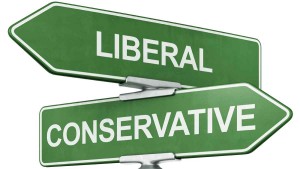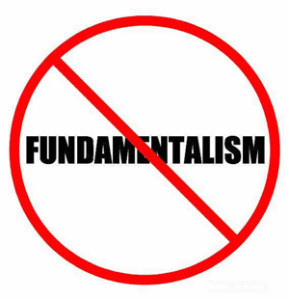It’s challenging to represent Christianity in the public square these days. Numerous public Christians are using the same words I use but the definitions in our vocabulary are quite different.
 Words like “conservative” and “liberal.”
Words like “conservative” and “liberal.”
While some Christians think of themselves as “conservative” and other Christians call themselves “liberal,” truth is we are all mixed.
There is goodness and wisdom in much of our shared religious, social and political traditions that ought to be conserved. There is harm and foolishness in many of our traditions that ought to be changed.
Conservative vs. Liberal is not the problem in either our faith or our politics. Fundamentalism is the problem.
Fundamentalism is arrogant, intransigent and rude. It refuses to compromise, insists on its own truth and seeks to decimate its opponents. Fundamentalism can see nothing wrong with itself and sees only the wrong in others. It is destructive, damaging and divisive. Fundamentalism is destroying our churches, our communities and our nation.
In contrast to Fundamentalism, authentic Conservatism seeks community rather than domination. Even as it holds tenaciously to its truth, Conservatism still treats alternative voices with respect. There is a deep lived wisdom within authentic communities of classic Conservatism.
In both our communities of faith and in our political system, opening ourselves to differing opinions and perspectives makes us wiser and stronger. When we are willing to consider new understandings, new possibilities and new people then we can actually live up to the faith our Founders invested in us – both the founders of our nation and of all our various religions.
It is possible and quite reasonable that openness to change can happen at the same time we remain grounded in eternal values of reverence, compassion and goodness.
As a liberal Christian minister, I value my conservative sisters and brothers. There is much reverence, compassion and goodness within the community of religious, social and political Conservatism. I know you – your generous works, your good intentions, your compassionate hearts. You are my family. You are my friends.
So I call on you Conservative Christians to step up: let your voices of goodness be heard in these troubled times. Speak out. Reclaim the respectful, thoughtful tradition of Classic Conservatism and rescue it from Fundamentalism. 
Together we must stand against the ugliness and anger that is hijacking religious faith and the American dream. Voices of reason and compassion need to speak with passion into this current public conversation. Help us drown out the clamor of hatred and intolerance that damages, destroys and divides. Help us reclaim a vocabulary of hope, both for our faith and for our country.
American politics and American Christianity must find the middle way. We can – and we must – find ways to change what needs to be changed all the while grounding ourselves in eternal values of reverence, compassion and goodness.
A great research paper exploring the differences between Liberal and Conservative thought is “When Morality Opposes Justice: Conservatives Have Moral Intuitions that Liberals may not Recognize”
Jonathan Haidt and Jesse Graham.’
It can be accessed at the Moral Foundations Website: http://moralfoundations.org/
Also, much of American fundamentalism comes for a collection of books freely distributed in the 1900’s. They were called “The Fundamentals” https://en.wikipedia.org/wiki/The_Fundamentals
I like what you wrote. Thanks.
Yes, fundamentalism is a problem, but what’s the point of religion if a person is ultimately going to rely on reason? Just cut out the middleman altogether.
The original mid 19th century “fundamentalism” involved using the tools of modern science, including but not limited to archeology plus literary analysis to discover what truths lay behind the bible as a book. It turned out that the history in the scriptures wasn’t so hot, but a lot of interesting things were learned that added depth and color to the Christian faith.
At some point those who favor inerrancy and literal interpretation took over the word as if they had some special access to the “fundamentals” of our faith. In truth they are literalist who believe as fact things even the authors intended as metaphor. Many of them are flat out ignorant because they have no idea that the book on their shelf is a politically influenced translation of two ancient tongues. They would be shocked if they read a transliteration. I would be shocked if they knew what “transliteration” means. Somehow I am not moved to refute these so-called “fundamentalist” on the basis of their opposition to science but rather on their obvious heresy. They persist in telling God how he must have done things. It is ours to discover, not to dictate. They also seem to have turned the practical aspects of the gospel and its Hebrew antecedent on its head. “Love your neighbor as yourself,” seems to have become “do unto others then run like hell.”
Interesting read
I love Father Richard Rohr. And admire the wisdom of Thich Nhat Hanh as well. Thanks for your comments Br. Martin; I appreciate the conversation.
I agree that dualistic thinking is a problem. However, my understanding and my experience lead me to believe that “either-or” thinking is much more typical in the Conservative mindset while “both-and” thinking is part of the definition of Liberal/Progressive ways of approaching the world. My point in this blog is that authentic Conservatism – even while holding fast to its own beliefs, even through an “either-or” approach – still has the ability for humility: the recognition that “I may be wrong” or “I still have more to learn.” Thoughtful Conservatives will engage in honest dialogue in order to offer respect to the other even if they disagree. Fundamentalism, on the other hand, lacks humility and respect. Fundamentalism can attach itself to any religion and any ideology. That’s our challenge for today.
I’m an atheist but I was raised in the United Church of Christ where the congregation was often more conservative then the minister. However, I learned early that the Bible was not meant to be a literal document and that members of a church can differ on many of their views. I often wind up arguing with other atheists online because they seem to view all religious people as fundamentalists, which is simply wrong.
Yes there is a wide range of ways to believe and to act within the Christian community. People who only hear today’s divisive, clamorous voices have trouble seeing the quieter expressions of faith. Thanks for speaking out Laurie.
Thank you for once again putting into words what so many of us feel but are unable to articulate clearly. I really needed to hear this today and be reminded of the kind, intelligent people who happen to be at a different point on the political or religious spectrum.
Charlotte, you stepped out here to further define our similarities and our differences. This was very helpful for me. I agree with your opinions regarding the damages wreaked by fundamentalism. It may be hard to see when one is in the throes of it, but it looks different when we are able to step away. Open dialogue is needed, open minds are even more necessary. Let us pray that God will guide us in these processes.
Most “Fundamentalists” aren’t entirely true fundamentalists and berate others who, historically, are.
Did you know that the term originally sprang from the publication of a series of articles articulating the “fundamentals” of the Christian Faith.
Originally, “Fundamentalists” we’re simply those Christians who held to those conservative doctrines held in common by all conservative, orthodox (as opposed to heterodox) Christians.
https://en.m.wikipedia.org/wiki/The_Fundamentals
Yes James, The Fundamentals were the work of Conservative Christians in order to counter Liberal historical critical scholarship. Some Conservatives probably consider Progressive theology to be ‘heterodox’ but we Progressives believe our beliefs and practices are absolutely faithful to the way of the Christ whose name we wear.